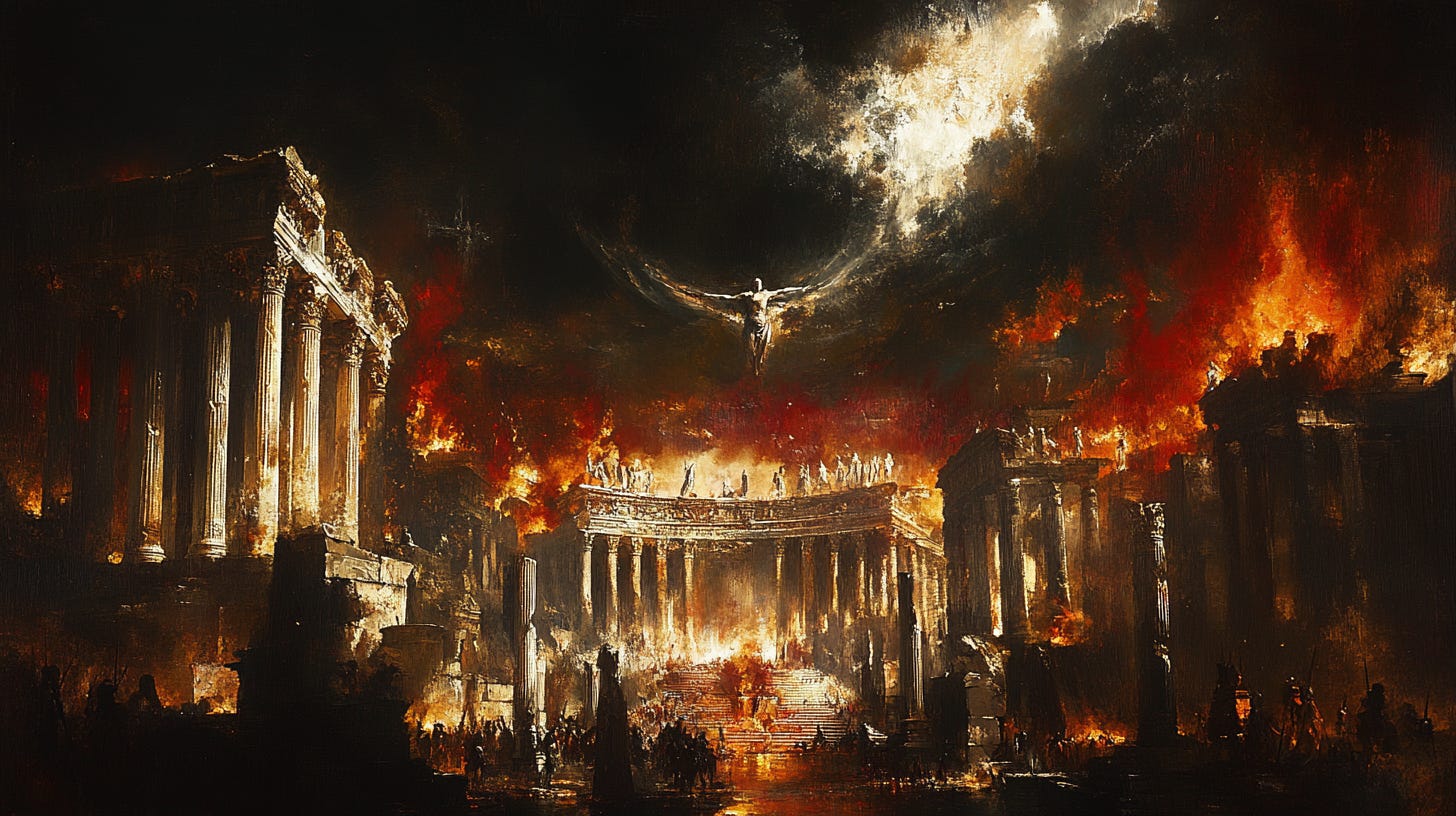"The past is not dead. It is not even past."
– William Faulkner
Around the first fire, beneath a sky heavy with stars, the first stories were told.
They were not mere entertainment.
They were maps of the soul, etched in flame and shadow.
They were the first myths, born of the human need to understand the infinite,
to wrestle with the chaos of existence and give it form.
These myths are not gone.
They are alive, woven into the fabric of the world, into the marrow of every life.
They are the patterns that shape us,
the eternal rhythms of creation and destruction, of descent and return.
The Hero’s Journey: The Eternal Path
The hero’s journey is not a story.
It is the blueprint of transformation, the map of becoming.
It is the call to leave the known,
to descend into the dark, and to emerge reborn.
In the Epic of Gilgamesh, the king seeks immortality,
only to find it in the legacy of his deeds.
In the Ramayana, Rama journeys into exile,
facing demons and gods to reclaim his destiny.
In the Popol Vuh, the Mayan Hero Twins descend into the underworld,
defeating death itself to bring light to the world.
And today, the hero’s journey is told again and again:
in the trenches of war, in the quiet battles of the heart, in the flicker of a movie screen.
Luke Skywalker leaves his desert home to face the shadow of Darth Vader.
Frodo Baggins carries the weight of the One Ring into the fires of Mount Doom.
The names change, but the pattern remains.
For the hero’s journey is not about slaying dragons or conquering kingdoms.
It is about the transformation of the soul.
It is the eternal truth:
to grow, one must first be broken.
The Sacred Trickster: Chaos as Creation
Not all myths are about heroes.
Some are about the tricksters, the sacred fools who shatter certainty.
Loki, the Norse shapeshifter, brings both ruin and renewal.
He is the fire that burns the old to make way for the new.
Coyote, in Native American stories, is both creator and destroyer,
teaching through mischief and mistake.
In Hindu mythology, Krishna dances between mischief and divinity,
breaking rules to reveal deeper truths.
The trickster is chaos incarnate,
the force that disrupts the stagnant, the comfortable, the known.
They remind us that creation and destruction are one,
that to build, we must first unmake.
Creation and Destruction: The Cosmic Dance
Every culture tells the story of how the world began—
and how it will end.
In the Norse Völuspá, the world is born from the body of a slain giant,
and it will end in fire and ice, only to rise again.
In the Hindu Rigveda, the universe is created from the sacrifice of Purusha,
the cosmic being whose body becomes all things.
In the Egyptian Book of the Dead, Ra sails through the underworld each night,
battling chaos to bring the dawn.
These are not just stories of gods and worlds.
They are the stories of every life.
We are born from the destruction of what came before.
We create, we destroy, we create again.
The universe itself breathes in this rhythm,
expanding and contracting, a heartbeat of stars.
Initiation: The Rite of Becoming
Every mythic journey begins with a threshold.
To cross it is to leave the known and enter the sacred.
In the Aboriginal Dreamtime, the young are initiated into the stories of the land,
becoming part of the eternal songline.
In the Eleusinian Mysteries of ancient Greece, initiates descended into darkness,
emerging with the secret of life and death.
In the rites of the Maasai, a boy becomes a warrior through trials of courage and endurance,
transforming pain into power.
These rites are not relics.
They are the patterns of every transformation.
To grow is to be initiated—
to face the fire, to descend into the dark, to emerge remade.
The Eternal Return: The Mythic Consciousness
Time is not a straight line.
It is a wheel, turning endlessly.
The myths of the past are not behind us.
They are within us, repeating, evolving, eternal.
The fall of Icarus echoes in every ambition that soars too high.
The sacrifice of Prometheus burns in every act of defiance for the greater good.
The descent of Persephone into the underworld is the rhythm of every winter,
and her return is the promise of every spring.
This is the eternal return:
the recognition that all things are connected, that all things are one.
The myths remind us that we are not separate from the cosmos.
We are its reflection, its song, its story.
Myth as Personal Transformation
The myths are not just stories of gods and heroes.
They are the stories of you.
Every heartbreak is Orpheus turning too soon.
Every triumph is Hercules lifting the impossible weight.
Every moment of doubt is Arjuna on the battlefield,
torn between fear and duty.
To live is to walk the mythic path.
To face the trials, to descend into the dark, to rise again.
The myths are not dead.
They are alive in every breath, every choice, every transformation.
The Call to Remember
The myths are not behind us.
They are the fire that burns within us.
They are the eternal patterns,
the rhythms of creation and destruction, of descent and return.
To forget them is to live as a shadow,
adrift in a world without meaning.
But to remember—
to truly remember—
is to awaken.
It is to see the hero in every struggle,
the trickster in every disruption, the cosmos in every breath.
It is to know that the past is not dead.
It is not even past.
It is you.


